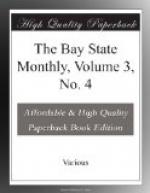“Betsey, my dear,” said Katie softly, “you’re so good. I have seemed different to you sometimes. You must not expect me to be like you.”
“I should not have done half so well,” said Elizabeth hastily.
Katie smiled. After this they sat and talked some time longer; it was the first free interview that they had had since their estrangement was over, and Elizabeth’s voice had a happy ring in it. After a time, Katie began to give an account of some gathering at which she had been present. At the sound of Lord Bulchester’s name, among the guests, Elizabeth’s attention wandered. She began to think of the young’s man’s strange reticence respecting Edmonson, and evident uneasiness about something connected with him. Why were they not friends still? Was it on account of this unknown something? All at once the light of conviction flashed over her face. She perceived at least one cause of the separation. Bulchester’s attentions to Katie were distasteful to Edmonson, for he wanted Katie to marry Stephen Archdale, because he feared lest Elizabeth should grow fond of him, lest Stephen should come to find a fortune convenient. Elizabeth’s unaided perceptions would never have reached this point; but in Edmonson’s anger at her second refusal of him he had dared to intimate such a thing, so darkly, to be sure, that she had not seen fit to understand him, but plainly enough to throw light upon the estrangement of the two men. “Distasteful,” was a light word to use in speaking of anything that Edmonson did not like; his feelings were so strong that he seemed always ready to be vindictive. Her feeling toward him for this intimation had been anger which had cooled into contempt of a nature like his, ready to find baseness everywhere. The suggestion was no reproach to her, for she had had no thoughts of disloyalty to Katie. As she sat there still seeming to listen, suddenly, it seemed to her, for she could not trace its coming, a picture rose before her with the vividness of reality. She saw Archdale and Edmonson standing together on the deck of the same vessel bound upon the same errand, always together; and she remembered Edmonson’ muttered words, and his face dark with passion over all its fairness.
She went home full of secret trouble, trouble too vague for utterance. Besides what she knew and felt there had been something else that she had not got at, and that disturbed Lord Bulchester. The rest of the day she was more or less abstracted, and went to bed with her mind full of indistinct images brooded over by that vague trouble, the very stuff of which dreams are made. And more than this, out of which the brain in the unconscious cerebration of sleep, sometimes, drawing all the tangled threads into order, weaves from them a web on which is pictured the truth.
[Footnote 5: Copyright, 1884, by Frances C. Sparhawk.]
* * * * *




